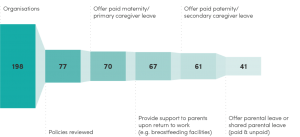Parental leave policies and flexible working options: short on equity
Equitable paid parental leave policies are critical to fostering gender transformative norms of family responsibility, compensating women for their unpaid labour, closing the gender pay gap, and promoting women’s leadership.
Further, flexible working policies that support individuals in meeting their caring responsibilities across their career paths play a significant role in empowering people to remain and advance in the workforce—particularly women.
27% (54/198) of organisations publish detailed information regarding their parental leave policies online. A further 12% of the sample (23/198) shared their internal policies directly with GH5050.
Guaranteed paid leave for primary and secondary caregivers ranges from zero to 68 weeks.
Support to new parents in returning to work, including on-site breastfeeding facilities, child care support and transitional flexible working arrangements, were found in the policies of 67 organisations.
Flexible working policies or arrangements for all staff (unrelated to parental leave) were found in the policies or on the websites of 60 organisations.


